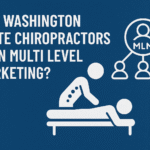Multi-level marketing (MLM) has gained traction among various professionals seeking supplementary income, including those in healthcare. Chiropractors in Washington State may be approached to join or promote health-related MLM companies selling nutritional supplements, therapeutic devices, or wellness products. However, engaging in MLM raises regulatory, legal, and ethical concerns for licensed practitioners. In Washington, chiropractors are held to strict professional standards that limit certain business activities—especially those that could affect patient trust or violate scope-of-practice laws. This article explores whether chiropractors in Washington State can legally and ethically participate in MLM ventures.
Understanding Multi-Level Marketing (MLM) in the Healthcare Context
Multi-level marketing (MLM) is a business model where individuals earn income not only from direct product sales but also from recruiting others into the business. Common in the wellness and health sectors, many MLM companies promote supplements, essential oils, skincare, or medical-adjacent devices, often targeting healthcare professionals for credibility and customer access.
In the context of chiropractic practice, involvement in MLM typically centers around health-enhancing products that are marketed as complementary to chiropractic care. This overlap raises concerns. When healthcare providers recommend or sell MLM products, it can blur the line between clinical care and personal profit. Patients may interpret such recommendations as medical advice, which increases the professional liability of the chiropractor and may trigger regulatory scrutiny.
Furthermore, the aggressive marketing strategies associated with MLMs—such as downline recruitment and incentivized sales—can conflict with the ethical standards expected of licensed healthcare professionals. Washington State regulators pay close attention to these conflicts when reviewing practitioner conduct.
Washington State Chiropractic Licensing Rules
In Washington State, chiropractors are regulated by the Washington State Department of Health (DOH) and the Chiropractic Quality Assurance Commission (CQAC). These bodies oversee licensure, scope of practice, and professional conduct. While there is no explicit law that outright bans chiropractors from participating in MLM businesses, the rules governing professional boundaries and ethical obligations significantly restrict how and when such involvement is appropriate.
Washington law (WAC 246-808) requires chiropractors to maintain professional integrity, avoid conflicts of interest, and prioritize patient welfare. If a chiropractor’s involvement in MLM influences patient care—whether through recommending products for personal financial gain or creating perceived coercion—that activity may be considered unethical or unprofessional conduct under RCW 18.130, the Uniform Disciplinary Act.
Additionally, chiropractors must avoid misrepresenting non-FDA-approved MLM products as medically necessary or part of a treatment plan. Promoting or selling such products within the clinic setting, especially without full disclosure or evidence-based justification, can lead to complaints, investigations, or disciplinary actions.
In short, while chiropractors are not explicitly prohibited from MLM participation in Washington State, they must comply with strict professional conduct standards. Any MLM involvement must be kept separate from patient care and clinic operations to remain compliant.
Legal and Ethical Considerations
Chiropractors in Washington State must navigate both legal requirements and ethical expectations when considering involvement in MLM. While the law may not ban MLM participation outright, chiropractors risk violating professional standards if their business activities create conflicts of interest or exploit the provider-patient relationship.
Conflict of Interest:
Recommending MLM products to patients can be interpreted as placing personal financial gain above patient welfare. This is especially problematic if the chiropractor earns a commission from sales or recruitment. Even if a product seems beneficial, the perceived bias can undermine patient trust.
Advertising and Misrepresentation:
Under Washington law, chiropractors must avoid false, misleading, or deceptive advertising. This includes any promotional materials or product claims related to an MLM. Promoting products with unverified health claims—or implying they are part of a prescribed treatment—can lead to regulatory action.
Disciplinary Risks:
If a chiropractor’s MLM activities are found to violate ethical guidelines or patient protection laws, the CQAC may investigate. Sanctions could include reprimand, fines, license suspension, or even revocation. These consequences are particularly likely if patients file complaints about undue pressure to buy products or if the chiropractor fails to properly disclose their financial interest.
Time and Attention Diversion:
There’s also a practical consideration: MLM businesses can consume time and energy that detracts from patient care. Regulators may view excessive involvement in outside businesses as compromising a chiropractor’s professional responsibilities.
Disclosure and Professional Boundaries
If a chiropractor in Washington State chooses to engage in an MLM venture, maintaining clear professional boundaries and transparency is essential. The Washington Chiropractic Quality Assurance Commission expects licensed practitioners to fully disclose any financial interest in products or services they recommend.
Disclosure Requirements:
Chiropractors must clearly inform patients if they have a financial interest in an MLM product being discussed or sold. This disclosure should be verbal and ideally documented in the patient’s file. Failing to do so could be viewed as deceptive or unethical, especially if the recommendation influences a patient’s purchasing decision.
Separating Clinical and Commercial Activities:
MLM activity should not be integrated into clinical care. Chiropractors must avoid promoting, storing, or selling MLM products in the treatment area or during a clinical consultation. Any sales or discussions should occur in a separate, non-clinical context—preferably outside of the practice entirely.
Avoiding Undue Influence:
The chiropractor’s authority as a healthcare provider must not be used to pressure or persuade patients into buying products. Even subtle endorsements can carry weight, so recommendations must be based solely on patient benefit, not personal profit. Offering incentives for product purchases or recruitment further violates professional ethics.
Written Office Policies:
It is advisable for chiropractors involved in MLM to have a written office policy outlining how product promotion is handled. This can help protect both the practitioner and the patient and demonstrate good-faith compliance with professional standards.
Conclusion
While Washington State does not explicitly prohibit chiropractors from participating in multi-level marketing, strict professional standards make such involvement risky. Chiropractors must avoid conflicts of interest, maintain transparency, and ensure that patient care is never influenced by personal financial incentives. Any MLM activity should be kept separate from clinical practice and accompanied by full disclosure to patients. Regulatory bodies like the Chiropractic Quality Assurance Commission take ethical breaches seriously, and violations can lead to disciplinary action. Chiropractors considering MLM participation should consult legal counsel or their licensing board to ensure compliance and protect their professional standing.

I’m Tangeer Mehedi, a digital marketing specialist helping chiropractors grow their practice. Through Google Ads, SEO, and targeted marketing strategies, I drive high-quality patients straight to your clinic doors. My focus is simple—turning clicks into real appointments.


